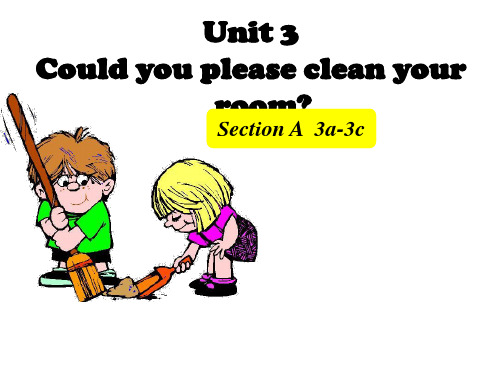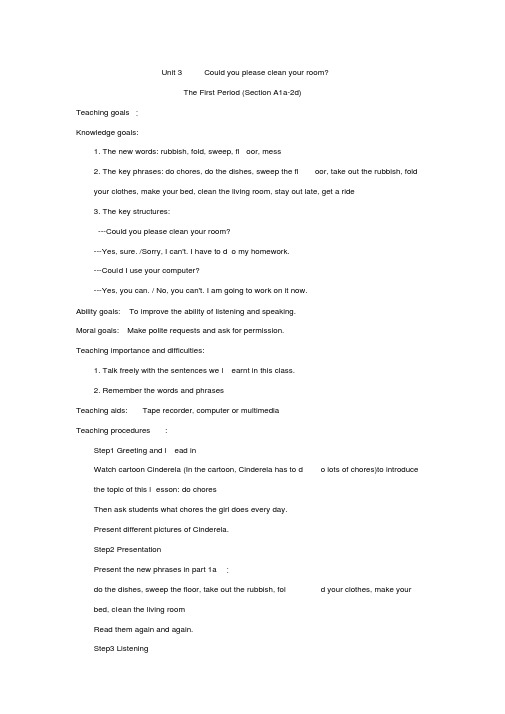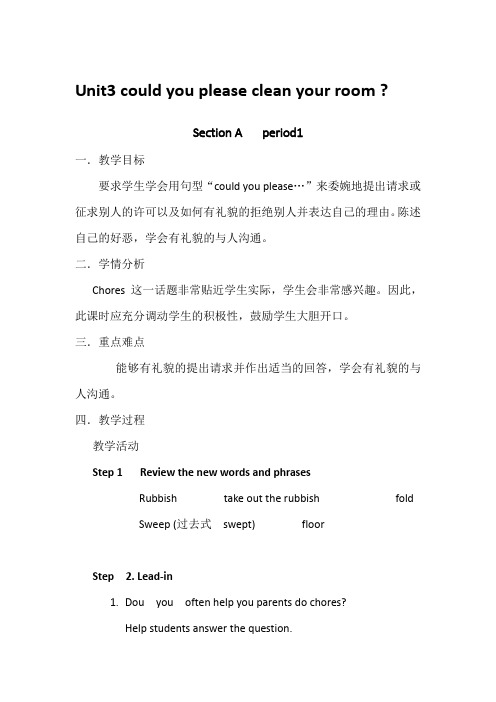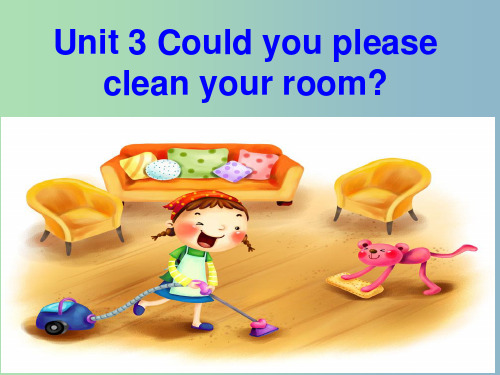八年级下册英语Unit3-Could-you-please-clean-your-room-SectionB重要考点
- 格式:doc
- 大小:125.00 KB
- 文档页数:6

Unit 3 Could you please clean your room?单元教学目标:三维目标:1语言目标:谈论做家务的词汇,及如何有礼貌的提出要求。
2 技能目标:能听懂和谈论做家务的话题;能写出重点单词和重点句型。
3 情感目标:培养学生爱劳动,分享家务的能力。
教学重点短语: do the dishes, make the bed, take out the rubbish, fold the clothes, sweep the floor, clean the living room ……句子:1. Could you please take out the rubbish?. Sure. / Sorry, I can’t. I have to finish homework first.2. Could I use your computer?Sorry. I'm going to work on it now.3. Well, could I watch TV?Yes, you can. But first you have to clean your room.教学难点:Make polite requestsAsk for permission课时划分:Period 1 Section A 1a – 2dPeriod 2 Section A 3a-3cPeriod 3 Section A Grammar focus-4cPeriod 4 Section B 1a-2ePeriod 5 Section B 3a-self checkSection A1 (1a – 2d)三维目标:1知识与技能:1〕重点单词和词组2〕使用could 做出礼貌要求和请求许可。
2.过程与方法:通过合作探究的方法结局本课的重点知识点3.情感态度与价值:学会照顾自己,培养自己的独立意识。
教学重点:谈论做家务的词汇,情态动词could的使用方法。



Unit 3 Could you please clean your room?The First Period (Section A1a-2d)Teaching goals:Knowledge goals:1. The new words: rubbish, fold, sweep, fl oor, mess2. The key phrases: do chores, do the dishes, sweep the fl oor, take out the rubbish, foldyour clothes, make your bed, clean the living room, stay out late, get a ride3. The key structures:---Could you please clean your room?---Yes, sure. /Sorry, I can't. I have to d o my homework.---Could I use your computer?---Yes, you can. / No, you can't. I am going to work on it now.Ability goals: To improve the ability of listening and speaking.Moral goals: Make polite requests and ask for permission.Teaching importance and difficulties:1. Talk freely with the sentences we l earnt in this class.2. Remember the words and phrasesTeaching aids: Tape recorder, computer or multimediaTeaching procedures :Step1 Greeting and l ead inWatch cartoon Cinderela (In the cartoon, Cinderela has to d o lots of chores)to introduce the topic of this l esson: do choresThen ask students what chores the girl does every day.Present different pictures of Cinderela.Step2 PresentationPresent the new phrases in part 1a:do the dishes, sweep the floor, take out the rubbish, fol d your clothes, make your bed, cl ean the living roomRead them again and again.Step3 ListeningT: Peter’s room is untidy, peter and his mother are at home, what shoul d they d o?chores or Mom’s chores?1. Now listen to the tape player, then finish part 1b. Peter’sListen it the first time, and check the answers2. Listen it again, then pay attention to the question:T: How does Mum ask peter to help her?----Could you please …?----Yes, sure. / Sorry, I can’t, I have to…Step 4 Pair workLook at the picture in 1a, ask your partner to d o the chores that you see.Example:A: Could you please sweep the fl oor?B: Yes, sure. Can you d o the dishes?ean the living room.A: Well, could you please do them? I ‘m going to clB: No problem.Step 5 Listening1. Look through the tasks in 2a and 2b carefully before listening.2. Play the tape the first time, let the students finish part 2a3. Play the tape the second time and let the stud ents finish the tasks 2b.4. Listen to the tape once more and ask the students to repeat after the tape and checkthe answers by themselves.Question: How to ask for permission?总结请求许可时,常用句型:---Could I…?---Yes, you can. / Sorry, you can’t.Step 6 Group workfather, Peter asks his father if he can do three Student A is Peter, Student B is Peter’smore t hings. Say “yes” or “no”, and give a reason. Such as:A: Could I use your computer?B: Sorry. I’m going to work on it now.A : Well, could I watch TV?B: Yes, you can. But first you have to clean your roomStep 7 Self-studyAsk the students to learn 2d by themselves and finish the tasks of self-study.1. Let students read the conversation loudly, then come up with some questions. Thestudent who raises a question will get 2 points. And the student who answers it will get1 point.2. Read it carefully, then find out the new words and difficult points. Let students showthem in class.3. Role-play the conversation in groups.Step 8 Language points1.Tony, could you please help out with a few things?help out (with something) 是一个动词短语, 表示在某人繁忙或是遇到困难时“给予帮助”。

Unit3 could you please clean your room ?Section A period1一.教学目标要求学生学会用句型“could you please…”来委婉地提出请求或征求别人的许可以及如何有礼貌的拒绝别人并表达自己的理由。
陈述自己的好恶,学会有礼貌的与人沟通。
二.学情分析Chores 这一话题非常贴近学生实际,学生会非常感兴趣。
因此,此课时应充分调动学生的积极性,鼓励学生大胆开口。
三.重点难点能够有礼貌的提出请求并作出适当的回答,学会有礼貌的与人沟通。
四.教学过程教学活动Step 1 Review the new words and phrasesRubbish take out the rubbish foldSweep (过去式swept) floorStep 2. Lead-in1.Dou you often help you parents do chores?Help students answer the question.2.Do yoy do these chores at home?Help students answer thequestion.(do the dishes . clean the room……)3.Show more pictures on the screen about doing the chores. Letstudents quess what chore it is. (do the dishes, sweep thefloor, take out the rubbish, clean the living room……)Step 3. Presentation1.Look and say “could you pless sweep the floor?” Guide studentsunderstand and make mentences. Then guide them answer thequestion. And give more situations.2.Sudents work in pairs. Help them to make polite requests byusing target language “could you please﹢动词原形”and answers“sure/of course/OK/certainly……or Sorry, I can’t ”Step 4. Group work.Make up ditferent conversations by themsdoes about doing the chores.HomeworkRole-play conversation (2d)。

Unit 3 Could you please clean your room?The First Period (Section A1a-2d)Teaching goals:Knowledge goals:1. The new words: rubbish, fold, sweep, fl oor, mess2. The key phrases: do chores, do the dishes, sweep the fl oor, take out the rubbish, foldyour clothes, make your bed, clean the living room, stay out late, get a ride3. The key structures:---Could you please clean your room?---Yes, sure. /Sorry, I can't. I have to d o my homework.---Coul d I use your computer?---Yes, you can. / No, you can't. I am going to work on it now.Ability goals: To improve the ability of listening and speaking.Moral goals: Make polite requests and ask for permission.Teaching importance and difficulties:1. Talk freely with the sentences we l earnt in this class.2. Remember the words and phrasesTeaching aids: Tape recorder, computer or multimediaTeaching procedures :Step1 Greeting and l ead inWatch cartoon Cinderela (In the cartoon, Cinderela has to d o lots of chores)to introduce the topic of this l esson: do choresThen ask students what chores the girl does every day.Present different pictures of Cinderela.Step2 PresentationPresent the new phrases in part 1a:do the dishes, sweep the floor, take out the rubbish, fol d your clothes, make your bed, cl ean the living roomRead them again and again.Step3 ListeningT: Peter’s room is untidy, peter and his mother are at home, what shoul d they d o?1. Now listen to the tape player, then finish part 1b. Peter’s chores or Mom’s chores? Listen it the first time, and check the answers2. Listen it again, then pay attention to the question:T: How does Mum ask peter to help her?----Could you please …?----Yes, sure. / Sorry, I can’t, I have to…Step 4 Pair workLook at the picture in 1a, ask your partner to d o the chores that you see. Example:A: Coul d you please sweep the fl oor?B: Yes, sure. Can you d o the dishes?A: Well, coul d you please do them? I ‘m going to cl ean the living room.B: No problem.Step 5 Listening1. Look through the tasks in 2a and 2b carefully before listening.2. Play the tape the first time, let the students finish part 2a3. Play the tape the second time and let the stud ents finish the tasks 2b.4. Listen to the tape once more and ask the students to repeat after the tape and check the answers by themselves.Question: How to ask for permission?总结请求许可时,常用句型:---Coul d I…?---Yes, you can. / Sorry, you can’t.Step 6 Group workStudent A is Peter, Stud ent B is Peter’s father, Peter asks his father if he can do three more t hings. Say “yes” or “no”, and give a reason. Such as:A: Could I use your computer?B: Sorry. I’m going to work on it now.A : Well, coul d I watch TV?B: Yes, you can. But first you have to clean your roomStep 7 Self-studyAsk the students to learn 2d by themselves and finish the tasks of self-study.1. Let stud ents read the conversation l oudly, then come up with some questions. Thestudent who raises a question will get 2 points. And the student who answers it will get1 point.2. Read it carefully, then find out the new words and difficult points. Let students showthem in class.3. Role-play the conversation in groups.Step 8 Language points1.Tony, could you please help out with a few things?help out (with something) 是一个动词短语, 表示在某人繁忙或是遇到困难时“给予帮助”。
Unit 3 Could you please clean your room知识点:1. Could you please do…?请你……,好吗?Could you please not do…?请你不要……,好吗?例:Could you please not smoke here?请不要在这抽烟好吗?2. like doing=like to dohate doing=hate to do3. in a mess 混乱 The is in a mess. 这个房间很乱。
4. at lease 至少5. any minute 随时,马上同义说法: any second(秒),any moment(时刻),any time6.as soon as 一……就……(1)He left as soon as he heard the news.他一听到消息就走了。
(2)I will tell you as soon as he comes back.(注意“主将从现”)他一回来我就告诉你。
7.reply to sb. = answer sb. 回答某人8.in surprise 吃惊地9.neither of us 我们两个都不…,例:Neither of us have a car.我们俩都没车。
10. pass sb. sth. = pass sth. to sb. 例:pass me the salt = pass the salt to me11. borrow sth. from 如:borrow books from the library 从图书馆借书12. lend sth. to sb. = lend sb. sthCould you lend me you bike? = Could you lend your bike to me?13.try to do 努力/尝试去做某事try not to do 努力/尝试不去做某事14.a waste of time 浪费时间例::Playing computer games is a waste of time.15.in order to 为了……例: In order to get good grades, we should spend more time on schoolwork.为了取得好成绩,我们应该多花点时间学习。
Unit 3《Could you please clean your room》一、教材分析本单元的主要语言功能是礼貌地请求别人做某事和向他人请求允许做某事,语法项目是Could you please do…?和Could I do …?从教材的整合来说它是Can you do…?(表请求)和Can I do …?(请求许可)的延续,只是表达更委婉,更有礼貌。
从本单元来说,它既是本单元的基本语言内容,又为本单元知识扩展和综合语言运用奠定坚实的基础。
本单元话题又贴近他们的生活,应该会有话可讲,有话要讲。
二、重、难点知识点提示重点:让学生掌握词汇的运用以及用Could you please do…? Could I do…?两个句型提出请求和请求许可。
难点:本节课表示家务的动词词组较多,较难记忆和运用。
三、重点知识点讲解:考点(一)词语辨析Ⅰ. either/neither /none/ all/ both的用法。
either:1.否定句中的“也”。
如 A:I don't like music.B: Me either.(A说:我不喜欢音乐。
B说:我也是)2.两者其中之一。
如:A:Which would you like to drink,water or tea? B:Either of them is ok.(A说:你喜欢喝水还是茶?B:说哪种都行。
)neither:两者都不。
如:Neither of my parents has been to Baijing.(我父母两人都没去过北京)。
特殊句式:neither…nor… Neither you nor me am a doctor.(不论你还是我都不是医生)此结构中be的形式根据临近它的主语而定,即就近原则。
表达“……也不……” 则用“Neither /Nor + be / V助 / V情 + 主”—The first one wasn’t bad. — Neither was the second.both:两者都。
Unit3 Could you please clean your room?SectionB重要知识点讲解1. Could I invite my friends to a party? 我能邀请我的朋友们来聚会吗?【解析】invite sb. to Sp. 邀请某人去某地【解析】invite v → invitation n邀请(1) invite sb. to do sth 邀请某人做某事(2)invite sb. to +地点邀请某人去某地You should refuse his __________(invite) .He is really friendly.He invited a lot of friends _________(come) to his birthday party.【2013江西中考4】Lucy is shy. She would not invite her classmates ____ dancing with here.A. practiceB. practiceC. practingD. to practce2. No, you can’t have a party. 不,你不能举办聚会。
【解析】can’t 不能;不会【2013重庆1】30.Hurry up,or you ____catch the train.A.can’t B.needn’t C.mustn't D. shouldn’t【2013 湖北黄冈】37. —Who’s the man over there? Is it M r. Black?—It ______ be him. He’s much taller.A. may notB. can’tC. will notD. mustn’t3.I don’t understand why some parents make their kids help with housework and chores at home.我不理解为什么有些父母在家让孩子们帮忙做家务和杂务。
【解析】make sb. do sth 让某人做某事m ake → made →made v. 做,制作,使得(1) make sb/sth + 形容词“让某人或某物…” make you happy(2) make sb/sth do sth 使某人做某事make me laugh.( ) Colors can change our moods and make us ___ happy or sad, energetic or sleep.A. to feelB. feelingC. feltD. feel【2013湖北鄂州】28. —I’m very tired these days because of the senior high school entrance examination(中考).—Why not ______ music? It can make you ______.A. listen to; relaxedB. to listen to; relaxedC. listen to; relaxD. to listen to; to relax【2013重庆中考】He lost his key. It made him ___ in the cold to wait for his wife’s return.A. to stayB. stayedC. staysD. stay【make短语】:make sure 确信make a dialogue编对话make a mistake犯错误(by mistake由于疏忽)make a noise吵闹make faces做鬼脸make friends (with)和..交朋友make room for给..让地方make tea沏茶make money赚钱make a decision作出决定make the bed 整理床铺make a living 谋生make fun of = laugh at 取笑【2012曲靖中考】Every morning I _______________(整理床铺) and clean the living room.4.They don’t have time to study and do housework,too.他们也没有时间来学习家务和做家务。
【解析】have time to do sth.有时间做某事have time =be free 有空5. Housework is a waste of their time. 做家务是在浪费他们的时间。
【解析】a waste of 浪费 a waste of time 浪费时间 a waste of money 浪费金钱( ) Don’t __________water. Can’t you see the sign “save water”?(waste)6.They should spend their time on schoolwork in order to get good grades and get into a good university.为了取得好成绩并考上一所好大学,他们应该把时间用在学习上。
【解析1】spend... on sth 在某事上花费......spend/pay/cost/take 花费(1)spend→spent→spent v 花费,主语是人◆ sb.+ spend +时间/钱+on sth ◆sb. +spend +时间/钱+(in)doing sth ◆spend on= pay for 支付He spends too much time on the computer games.( ) Remember to spend some time __ your loved ones, because they’re not going to be around forever.A. fromB. withC. inD. on( ) 【2012湖南永州】My father _____ one hundred thousand yuan on his new car.A. spentB. costC. paid(2) pay →paid →paid v 支付,主语是人◆sb.+ pay + 钱+for sth I pay 10 yuan for the book.( ) — How much did you ____ for this computer?— Five hundred dollars.A. costB. takeC. spendD. pay(3) cost→ cost→ cost v 花费,主语是某物或某事◆sth cost sb. +钱某物花费某人多少钱A new computer costs me a lot of money.( )【2012广西贵港】I bought a new sweater last weekend. It ____ me 120 yuan.A. paidB. takeC. costD. spend(4)take→took → taken v 花费◆It takes /took sb. some time to do sth. 做某事花费某人多长时间It takes him 3 hours to do his homework.【2013黑龙江绥化】10. It will ________ them several years to learn English well.A. costB. takeC. spend【2012曲靖中考】--Are you always online?--Yes. It ____ me a lot of time to read the web pages I likes. It’s the be st way to kill time.A. takesB. spendsC. usesD. pays【2013鞍山】It only______ him 20 minutes __________to his office every day.A. takes, to driveB. took, driveC. takes, driveD. took, to drive【2013湖北荆州】22. It usually Mum about half an hour to cook supper.A. paysB. takesC. spendsD. costs【2013四川雅安】4. I spent $5 this book.A. inB. to buyC. buyingD. buy【2013山东济宁】22. — Do you know the price of the ticket?—Yes. Each______¥180.A. paysB. costsC. takesD. spends【2013四川遂宁】24. Paul’s parents were worried that he too much time chatting on line.A. spentB. paidC. took【2013山东青岛】9. — How much is the ticket to Central Park?—A one-way ticket ____ $40, and you can _____ another $20 for a round-trip.A. costs, payB. cost, spendC. pay, spendD. spends, pay【解析2】in order to “目的是;为了” 后接动词原形。
in order to do sth 为了做某事( ) He ran quickly in order not _____ late for the meeting. A. to be B.be C. being【2012江苏连云港2】A lot of doctors gathered in Harbin ____ save “China’s most beautiful teacher” — Ms. Zhang Lili.A. So thatB.in order toC.in order thatD.as a result【解析3】get into =enter 进入get up 起床get back 返回get over 克服【2013新疆乌鲁木齐2】27. If Ted can _______ his difficulties, he’ll make great progress.A. come overB. get overC. get offD. come out7.It is the parents’ job to provide a clean and comfortable environment at home for their children.在家为孩子们提供一个干净、舒适的环境是父母的义务。